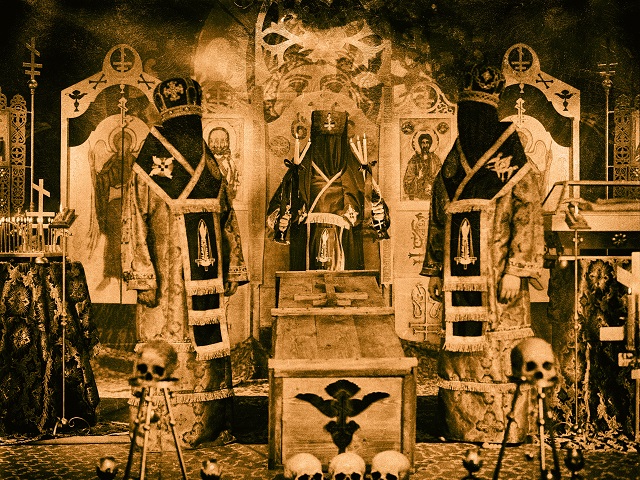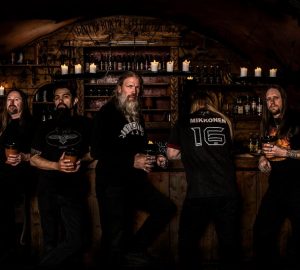Theatricals and a strong visual presentation are powerful assets to any performance, yet in metal, they’re few and far between. Over the years we have seen pirate-themed tomfoolery in Alestorm, fantastical fights and fury (and unicorns) in Gloryhammer’s power metal punch, and the theatrical brilliance of Tenacious D. Yet, despite its powerful and extreme nature, black metal often lacks the visual, theatrical representation of its music, themes, and lyrics. Then Poland’s Batushka came onto the scene in 2015 and changed everything.
Until the release of the outfit’s debut, Liturgoiya, black metal had never been paired so gorgeously with visuals and theatrics. Inspired through and through by the Eastern Orthodox Church, their music and live visuals are a symbiosis of sound and stage which had not been expressed to this extent or grandiosity previously. Their success was a result of exquisite attention to detail, both in and out of the studio, with Litourgiya seeming like more of a journey than a simple record or stage performance.
Jump to 2019, and it’s been an interesting year for the name ‘Batushka’ with disputes left, right and centre regarding the ownership of the project. Two of the original members, Krzysztof Drabikowski and Bart?omiej Krysiuk, are currently in dispute over who has the rights/ownership of Batushka, and consequently, each have created their own record. Krysiuk’s Batushka has now been signed up to Metal Blade Records for the release of Hospodi, while Krzysztof’s band, titled ‘Batushka’ in Cyrillic, has also dropped a full record.
Hospodi revolves around the Polish Liturgy of Death, and contains chants and references to songs which have been considered traditional to their country for generations. This homage to their homeland and heritage is certainly respectable and adds to the atmosphere of the record’s introduction. Wozglas, Hospodi’s opener, sets the scene well with mournful bells and an ominous chant, leading into the melodic, funeral chant-esque Dziewiatyj Czas. Right off the bat, it’s a totally different sound to Litourgiya. It’s still sodden in atmospherics, but with a significantly darker tone to that of its ancestor, with melodic guitars accompanying the piercing shrieks and damning lows of the outfit’s vocalist.
Wiezcernia is arguably one of Hospodi’s strongest tracks. Ferocious blast beats pair perfectly with Krysiuk’s shrieks and the low chants of the choir following him. Unexpectedly, the track takes a turn towards groovy rock with a sound reminiscent of Satyricon. These moments snag you and make you invested in the record; it may not have the same punch as Litourgiya, but the new elements mixed into the mysterious concoction are oh-so-good. Wieczernia ends with an almost triumphant-sounding bellow of choir chanting, and an ominous outro leading to the next track. With such a hard-hitting behemoth showing up so soon in the record, it brings a lot of promise for the rest of Hospodi.
The latter half of the record has some interesting tracks. Tretij Czas is a dark, slow builder, with a repeating guitar pattern which adds heavy distortion over a building choir; catchy, marching drum-esque patterns then emerge before exploding into its full, bleak form. Szestoj Czas brings the more (somewhat ironically) uplifting, melodic guitar passages with Krysiuk’s shrieks once more taking the centre stage and dominating the track well, whilst harmonising backing choirs sit behind and make it one of the highlights of Hospodi’s latter half.
There are moments where Hospodi does shine, such as the unexpectedly groovy riff in Wieczernia, but it lacks the tonality and chunks of quality that made the debut so magnificent. The damning, yet somewhat hypnotic chimes and taps of bells which announced the band’s arrival (be it on record or on the stage), and the ability of Litorgiya to create a crescendo of tension through these chimes and chants, feels dampened here. Hospodi, in contrast, tries a little too hard to be dark and mysterious. That said, the record’s closer and title track provides atmosphere and the aforementioned qualities in abundance, which leaves a more pleasant sound in your ears as the sermon ends. One only wishes this would have resonated through the entire record.
Overall, Bart?omiej Krysiuk’s version of Batushka is one which demonstrates a desire to recreate the success of Liturgoiya, without one of the key minds which made it possible. One can certainly appreciate the musicianship of the individuals and it has its incredible moments, however it lacks the level of depth that permeates through previous material. To fully understand what is missing from such a special project, you may also want to listen to Krzysztof Drabikowski’s album too.
6/10
Standout Tracks: Wieczernia, Szestoj Czas
For Fans Of: Mayhem, Behemoth
Written by: Jordan McEvoy





